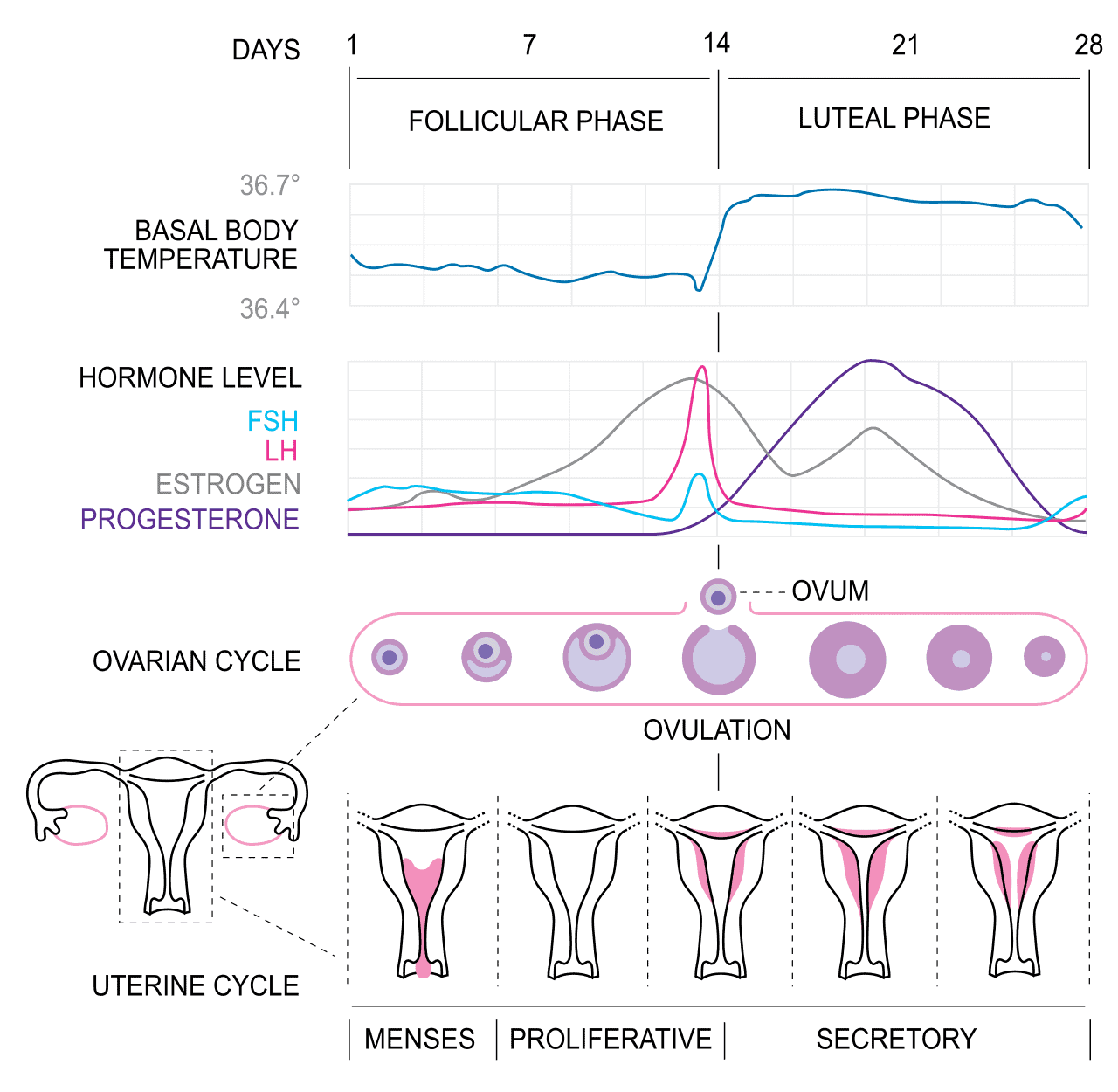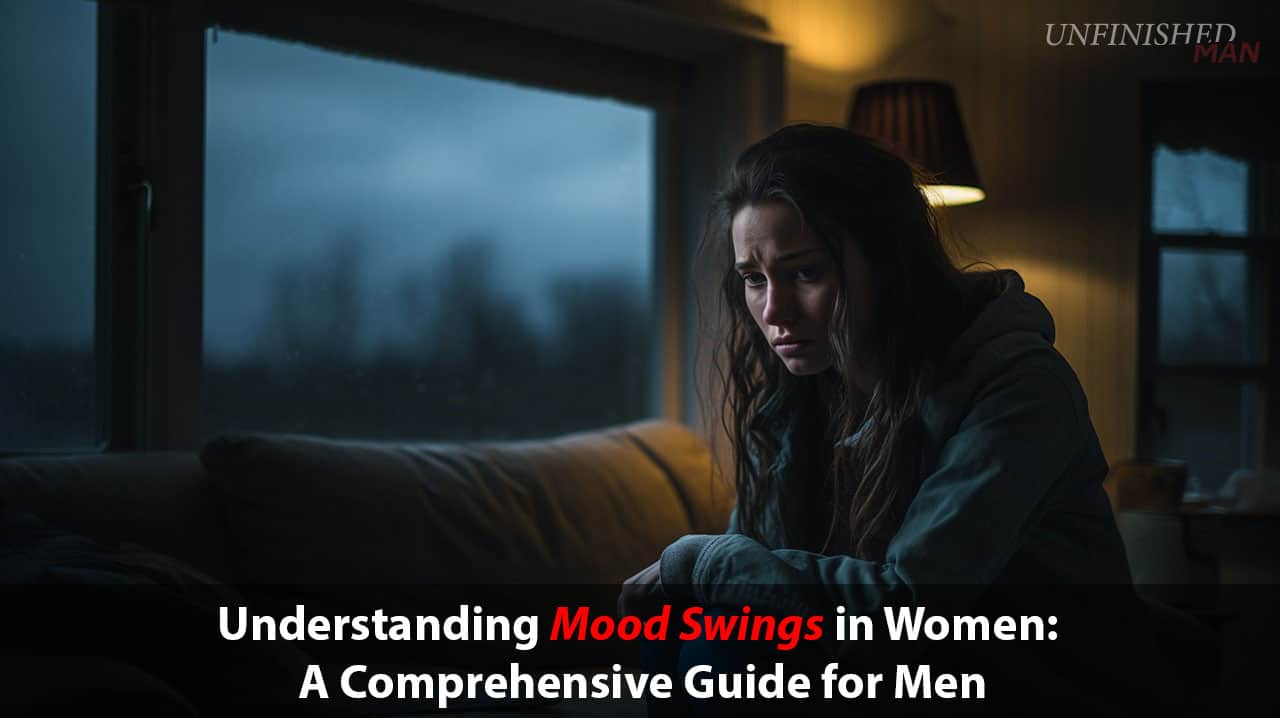You’re not alone if you’ve ever wondered why the women in your life experience so many mood swings. Just like you, I was puzzled about this, too, until I uncovered some enlightening scientific facts.
This article will explore both hormonal and non-hormonal causes of these emotional roller coasters, often related to menstrual cycles, stress levels, dietary factors, and more in women’s health.
Stay tuned as we delve into what triggers these shifts in mood and how they can be effectively managed!
Key Takeaways
Mood swings in women can be caused by hormonal changes during different life stages, such as puberty, pregnancy, and menopause. Premenstrual syndrome (PMS) and premenstrual dysphoric disorder (PMDD) can also contribute to mood fluctuations.
Non-hormonal factors like stress, psychiatric disorders (ADHD, depression, bipolar disorder), chronic illnesses (dementia, diabetes, thyroid disorders), and dietary factors (caffeine and alcohol consumption) can also trigger mood swings in women.
Understanding the causes of mood swings is important for effective management. Adopting healthy lifestyle habits such as regular exercise, a balanced diet, stress management techniques, adequate sleep, and seeking professional help when needed can significantly improve emotional well-being.
It is crucial to consult a doctor if mood swings become severe or significantly impact daily life.
Table of Contents
Understanding Mood Swings

Mood swings are characterized by sudden and intense changes in emotions, ranging from feelings of happiness or excitement to sadness or irritability. Various factors can influence mood swings in women, leading to a rollercoaster of emotions.
Mood swings definition
Mood swings, in essence, are rapid shifts in emotions and feelings that seem to come out of nowhere. These intense fluctuations can range from feelings of extreme happiness or euphoria to periods of deep sadness or despair.
For women especially, these emotional ups and downs aren’t uncommon due largely to hormonal changes tied to menstruation, pregnancy, and menopause. It’s not solely a hormone game, though; stressors like worry or psychological disorders could trigger mood swings too.
As a man understanding this phenomenon can help better navigate relationships with the women in your life – be it your partner, sister, friend, or mother.
Factors influencing mood swings
As a man, it’s crucial to comprehend the factors that can influence these mood swings in women. The main contributors include:
- Hormonal changes: The female body goes through numerous hormonal fluctuations during different life stages. Key periods include puberty, pregnancy, and menopause, all of which involve significant shifts in hormones like estrogen and progesterone.
- Premenstrual syndrome (PMS) and premenstrual dysphoric disorder (PMDD): These conditions affect many women before their menstrual cycle. Women dealing with PMS experience symptoms like bloating, fatigue, and changes in appetite, whereas those suffering from PMDD show severe depression and extreme irritability.
- Stress: Women’s emotional responses tend to be more intense compared to men’s, thus making them more susceptible to stress-induced mood swings.
- Psychological disorders: Conditions such as ADHD, bipolar disorder, or depression can cause significant mood swings in women. Interestingly, emotional lability is particularly common among adolescents with ADHD.
- Chronic illnesses: Medical conditions like hypothyroidism can cause hormone imbalances leading to mood instability in women.
- Dietary factors: Consuming specific types of food items often leads to mood changes, too; for instance, researchers have found a possible link between gluten consumption and mood disorders in women.
- Lack of sleep: Inadequate sleep disrupts the hormone balance resulting in frequent shifts in mood.
- Medication: Some drugs, such as long-term antidepressants use or birth control pills, impact estrogen levels causing drastic changes in mood.
Hormonal Causes of Mood Swings in Women

Hormonal causes of mood swings in women include premenstrual syndrome (PMS), premenstrual dysphoric disorder (PMDD), puberty, pregnancy, and menopause.
Premenstrual syndrome (PMS)
Premenstrual syndrome, widely known as PMS, is quite a common yet complex condition affecting women. It’s not just about physical discomfort but extends to emotional turmoil too – and this all happens one to two weeks before the onset of their menstrual period.
Now, statistics reveal an interesting fact that 90 percent of women go through some or other kind of PMS-related symptoms during this time. Mood swings are a major part of these symptoms caused by changes in hormone levels such as progesterone and serotonin.

Interestingly enough, these hormonal fluctuations can lead to severe depression or extreme irritability along with fatigue and bloating, among others—all adding up to mood swings! As someone who cares about her well-being, knowing how PMS works goes a long way in understanding her mood fluctuations better, and she might be helpless against herself due to biological factors beyond her control.
Premenstrual dysphoric disorder (PMDD)
Premenstrual dysphoric disorder (PMDD) is a more severe and rare type of PMS that affects up to 5 percent of women. It can cause extreme shifts in mood, severe depression, extreme irritability, fatigue, changes in appetite, bloating, and more.
PMDD is different from premenstrual syndrome (PMS) as it involves more severe symptoms that can significantly impact daily functioning. Hormonal fluctuations particularly changes in estrogen and progesterone levels, are believed to play a role in the development of PMDD.
Understanding PMDD can help men support the women in their lives who may be experiencing these challenging mood swings during their menstrual cycle.
Puberty
During puberty, both boys and girls go through a series of changes, including physical, emotional, and psychological development. While these changes are natural and necessary for growth, they can also result in mood swings.
Hormonal fluctuations during puberty can impact the brain’s chemistry and lead to emotional ups and downs. It’s important to remember that mood shifts during this time are completely normal and part of the process of becoming an adult.
However, if you find yourself struggling with extreme mood swings or feeling overwhelmed by your emotions, it may be helpful to talk to a trusted adult or healthcare provider who can provide guidance and support.
Pregnancy
During pregnancy, a woman’s body undergoes significant hormonal changes that can contribute to mood swings. Fluctuating levels of estrogen and progesterone can affect neurotransmitters in the brain, leading to mood changes.
Along with these hormonal shifts, the physical and emotional changes of pregnancy, such as fatigue, nausea, and increased stress, can also play a role in mood swings. It’s important to recognize and address these mood fluctuations during pregnancy for the well-being of both the mother and baby.
Seeking support from healthcare professionals like obstetricians or therapists can be beneficial in managing mood swings during this time. Additionally, practicing self-care through activities like getting enough rest, engaging in regular exercise, and using stress-reduction techniques may help alleviate some of these symptoms.
Menopause
During menopause, women experience a natural decline in estrogen levels, which can lead to mood swings. These hormonal changes can result in emotional ups and downs that may be more intense than regular sadness.
Menopausal women may also experience symptoms such as hot flashes, insomnia, reduced sex drive, and changes in their menstrual cycle. It’s important to understand that these mood shifts are a normal part of the menopausal transition.
Taking care of physical and mental health through regular exercise, maintaining a balanced diet, managing stress effectively, getting enough sleep, and considering hormone replacement therapy or other prescription medication if necessary can help stabilize mood during this time.
Non-Hormonal Causes of Mood Swings in Women

Non-hormonal causes, such as stress, psychiatric disorders, chronic illnesses, and dietary factors, can also contribute to mood swings in women.
Stress
Stress can have a significant impact on a woman’s mood, leading to emotional ups and downs. When we experience stress, our bodies release hormones like cortisol, which can affect our brain chemistry and contribute to mood swings.
Additionally, chronic stress can lead to feelings of anxiety and depression, further exacerbating mood fluctuations.
It’s important to address stress in order to manage mood swings effectively. One way to do this is through stress management techniques such as meditation, deep breathing exercises, or yoga.
These practices help calm the mind and reduce the effects of stress on our emotions.
Another essential aspect is ensuring adequate sleep. Poor sleep not only increases stress levels but also affects hormone regulation in the body, making women more susceptible to mood swings.
By prioritizing good sleep habits, such as sticking to a consistent bedtime routine and creating a calming environment for sleep, women can improve their overall well-being and minimize mood fluctuations caused by stress.
Lastly, it’s crucial to identify sources of stress in your life and find healthy ways to cope with them. This might involve setting boundaries at work or finding activities that help you relax and unwind.
Psychiatric disorders
Psychiatric disorders such as ADHD, depression, and bipolar disorder can contribute to mood swings in women. These conditions affect the brain’s chemical balance and can disrupt normal mood regulation.
For example, individuals with ADHD may experience sudden shifts in attention and focus, leading to mood fluctuations. Depression is characterized by persistent feelings of sadness or emptiness that can result in extreme irritability and changes in mood.
Similarly, bipolar disorder causes alternating periods of mania (elevated moods) and depression, resulting in significant emotional ups and downs. It’s important to remember that these psychiatric disorders are medical conditions that require proper diagnosis and treatment from healthcare providers experienced in mental health care.
Chronic illnesses
Chronic illnesses such as dementia, concussion, stroke, diabetes, multiple sclerosis, Parkinson’s disease, sleep disorders, and thyroid disorders can all contribute to mood swings in women.
These conditions affect the body and brain in various ways, leading to changes in emotions and moods. For example, neurological conditions like dementia and Parkinson’s disease can cause imbalances in neurotransmitters that regulate mood.
Similarly, hormonal imbalances caused by thyroid disorders or fluctuations in blood sugar levels due to diabetes can also impact mood stability. Managing these chronic illnesses through proper medical care and making lifestyle changes is crucial for minimizing mood swings and maintaining overall well-being.
Dietary factors
Maintaining a healthy diet is crucial for managing mood swings in women. What we eat can greatly impact our emotional well-being. Here are some dietary factors that can contribute to mood swings:
- Caffeine: Consuming excessive amounts of caffeine, found in coffee, tea, and energy drinks, can lead to anxiety and mood fluctuations.
- Alcohol: While alcohol might initially provide a boost in mood, excessive consumption can negatively affect mental health and lead to depression and irritability.
- Sugar: Refined carbohydrates and high-sugar desserts can cause blood sugar levels to spike and crash, leading to mood swings and fatigue.
- Calcium supplements: Adequate calcium intake has been shown to ease symptoms of depression, anxiety, and emotional fluctuation associated with premenstrual syndrome (PMS).
- Diet changes: Incorporating nutrient-dense foods into your diet is essential for stable moods. Focus on consuming complex carbohydrates from whole grains, fruits, and vegetables.
- Vitamins and minerals: Certain nutrients play a vital role in maintaining balanced moods. Magnesium, zinc, iron, vitamin B5, vitamin B6, vitamin B12, and vitamin C are all important for mental well-being.
- Phytoestrogens: Foods containing phytoestrogens like soy products (tofu, edamame), Mexican wild yam, black cohosh, dong quai, red clover, alfalfa, licorice root extract have been found to help regulate hormone imbalances.
- Legumes: Peas, beans (such as lentils), and peanuts contain valuable protein along with B vitamins that contribute positively to serotonin production.
Managing Mood Swings in Women

To manage mood swings in women, it is important to incorporate regular exercise, maintain a balanced diet, practice stress management techniques, and ensure adequate sleep. These lifestyle changes can help stabilize moods and promote overall well-being.
Want to learn more about managing mood swings? Keep reading!
Regular exercise
Regular exercise is a key factor in managing mood swings. Engaging in about 30 minutes of moderate exercise, such as brisk walking or cycling, five days per week can have significant benefits for both your physical and mental health.
Not only does exercise help to stabilize your mood, but it also improves overall well-being. Studies have shown that regular physical activity releases endorphins, which are natural mood-boosting chemicals in the brain.
Exercise has also been found to reduce symptoms of anxiety and depression, two common factors contributing to mood swings. In addition, maintaining a regular workout routine can improve sleep quality and increase energy levels throughout the day.
Balanced diet
A balanced diet is crucial for managing mood swings in women. Here are some key components to include in your daily meals:
- Fresh fruits and vegetables: These are rich in essential vitamins, minerals, and antioxidants that help stabilize mood and promote overall well-being. Include a variety of colorful options such as broccoli, carrots, spinach, pumpkin, Brussels sprouts, cauliflower, tomatoes, and sweet potatoes.
- Whole grains: Opt for complex carbohydrates found in whole grains like brown rice, quinoa, oats, and whole wheat bread. These provide sustained energy levels and prevent blood sugar fluctuations that can contribute to mood swings.
- Lean proteins: Incorporate lean sources of protein such as chicken breast, fish, tofu, legumes (peas, beans, lentils), and peanuts into your meals. Protein helps regulate blood sugar levels and supports the production of neurotransmitters responsible for maintaining stable moods.
- Healthy fats: Include sources of healthy fats like avocados, nuts (almonds, walnuts), seeds (chia seeds, flaxseeds), and olive oil in your diet. These fats support brain function and help maintain stable moods.
- Calcium-rich foods: Adequate calcium intake has been linked to improved mood in women. Include dairy products or calcium-fortified alternatives like soy milk or almond milk to meet your daily calcium needs.
- Vitamins and Minerals: Ensure you’re getting enough magnesium, zinc, iron, vitamin B5 (pantothenic acid), vitamin B6 (pyridoxine), vitamin B12 (cobalamin), vitamin C from your diet or supplements as these nutrients play a role in regulating mood.
Stress management techniques
Stress can have a significant impact on mood swings, regardless of gender. Here are some stress management techniques that can help regulate emotions and improve overall well-being:
- Practice mindfulness: Engaging in mindfulness exercises, such as meditation or deep breathing, can help calm the mind and reduce stress levels.
- Engage in physical activity: Regular exercise releases endorphins, which are known as “feel-good” chemicals. Physical activity also helps to reduce stress hormones like cortisol and promotes better sleep.
- Seek support from others: Talking to a trusted friend or family member about your feelings can provide emotional support and help alleviate stress.
- Establish healthy boundaries: Setting boundaries with work, relationships, and personal responsibilities can help prevent overwhelm and reduce stress levels.
- Prioritize self-care: Taking time for yourself is crucial for managing stress. Engage in activities you enjoy, practice self-compassion, and make sure to get enough restful sleep.
- Practice relaxation techniques: Incorporating relaxation techniques into your daily routine, such as listening to calming music or taking a warm bath, can help reduce stress levels.
- Maintain a healthy lifestyle: Eating a balanced diet rich in fruits, vegetables, whole grains, and lean proteins and staying hydrated can support optimal brain function and reduce the impact of stress on mood swings.
Adequate sleep
Getting enough sleep is crucial for managing mood swings in women. Adequate rest allows the body and mind to recharge, contributing to improved emotional stability. Lack of sleep can lead to increased irritability, stress, and changes in mood.
Research has shown that women who consistently get less than 7-8 hours of sleep per night are more likely to experience mood fluctuations and heightened emotional distress.
Sleep plays a vital role in regulating hormone levels, including those involved in mood regulation, such as serotonin and progesterone. Without enough restful slumber, these hormones can become imbalanced, leading to greater susceptibility to mood swings.
Additionally, getting sufficient sleep helps support overall mental health by reducing the risk of anxiety and depression.
To promote better sleep hygiene:
- Establish a regular bedtime routine.
- Create a comfortable sleeping environment.
When to Consult a Doctor for Mood Swings

If you’re experiencing mood swings that are interfering with your daily life and relationships, it may be time to consult a doctor. While some mood swings can be normal, persistent and severe shifts in mood could indicate an underlying medical condition or hormonal imbalance that requires professional attention.
It’s important to seek medical advice if your mood swings are accompanied by other symptoms such as extreme fatigue, changes in appetite, difficulty sleeping, or feelings of sadness or hopelessness.
These could be signs of a more serious issue like depression or a hormonal disorder.
Additionally, if you notice that your mood swings coincide with certain events in your life, such as the onset of puberty, pregnancy, menopause, or the use of certain medications or birth control methods, it’s worth discussing these changes with a healthcare provider.
Remember to keep track of your symptoms and their frequency using a journal or app so that you can provide accurate information to your doctor. They may recommend further assessments, such as blood tests to check hormone levels, or refer you to a specialist for further evaluation.
It’s always better to err on the side of caution when it comes to your mental health. Don’t hesitate to reach out for help if you feel overwhelmed by intense emotional ups and downs.
With proper diagnosis and treatment from healthcare professionals specializing in women’s health issues and mental wellness care, there is hope for managing your mood swings effectively.
Frequently Asked Questions About Mood Swings in Women
What are the common causes of mood swings in women?
Mood swings in women can be caused by hormonal changes during the menstrual cycle, pregnancy, and menopause. Other factors such as stress, lack of sleep, certain medications, and underlying mental health conditions may also contribute to mood swings.
How do hormones affect mood in women?
Hormones play a significant role in regulating emotions and moods in women. Fluctuations in estrogen and progesterone levels throughout the menstrual cycle can impact neurotransmitters responsible for mood regulation, leading to emotional instability and mood swings.
Can diet affect mood swings in women?
Yes, diet can have an impact on mood swings in women. Consuming excessive amounts of sugar or caffeine, skipping meals, or having nutrient deficiencies can disrupt blood sugar levels and serotonin production, potentially causing fluctuations in moods.
Are there any lifestyle factors that contribute to mood swings in women?
Yes, several lifestyle factors can contribute to mood swings in women. Lack of regular exercise, poor stress management techniques, substance abuse, or excessive alcohol consumption can all influence hormonal balance and trigger emotional disturbances resulting in frequent mood swings.
Conclusion
In conclusion, mood swings in women can be caused by a variety of factors, including hormonal changes, stress, psychiatric disorders, and dietary factors. Understanding the causes behind these mood shifts is crucial for effective management.
By adopting healthy lifestyle habits such as regular exercise, a balanced diet, stress management techniques, and adequate sleep, women can better navigate through mood swings and maintain emotional well-being.
It is important to consult a doctor if mood swings become severe or significantly impact daily life.


